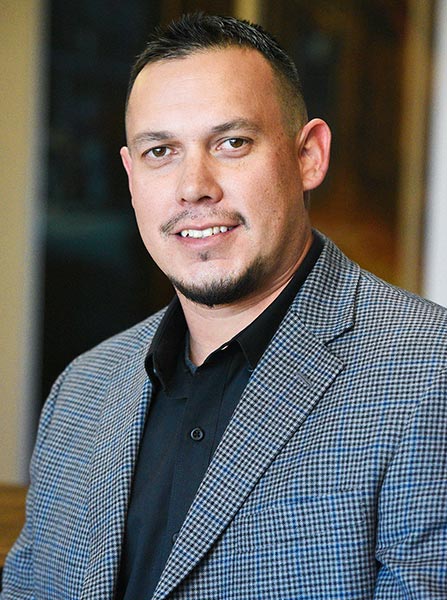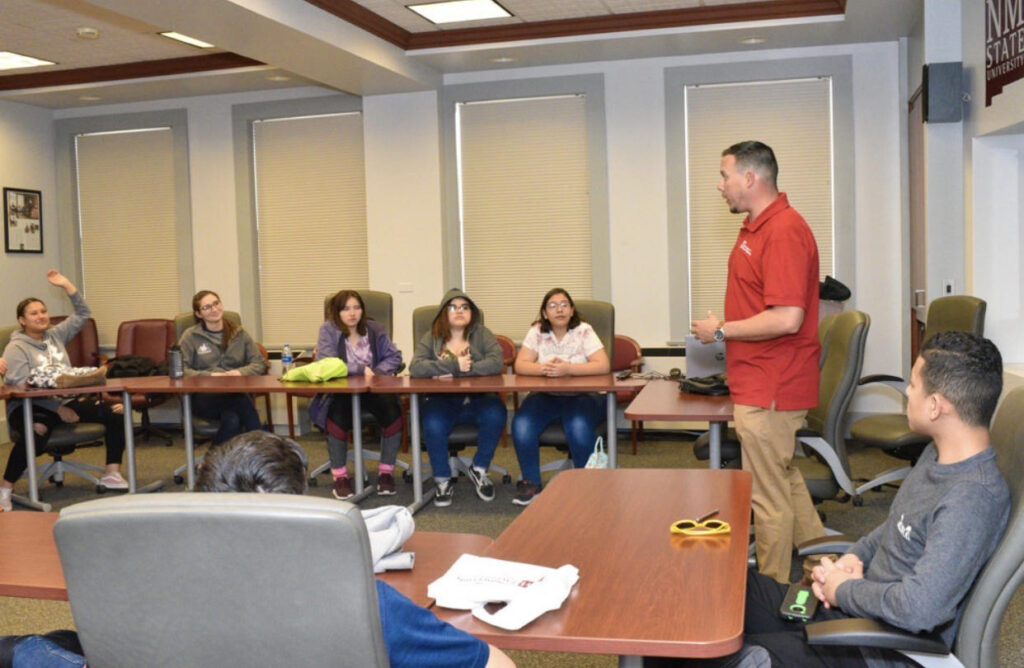
experience
David got his start surveying with Wilson & Company in 2001 as a rodman. He enjoyed the experience so much that he decided to pursue a career in surveying and enrolled in the surveying engineering program at New Mexico State University in 2003. David graduated from New Mexico State University with his Bachelor of Science in 2007. He went on to become licensed in the state of New Mexico and in 2012 became surveyor for the city of Albuquerque. In 2014, David joined his now business partner John D. Gallegos to become president of Construction Survey Technologies (CSTi), where he currently works. David is a member of New Mexico Professional Surveyors and served as its 2016 president. In 2017, David was named one of xyHt magazine’s 40 Under 40 for Remarkable Geospatial Professionals. In summer 2018 and 2019, David coordinated a full day of hands-on surveying activities with middle school and high school students as part of the NM PREP Academy, which is a STEM summer camp hosted at New Mexico State University. This past year, David has also served as a professional advisor with the NMSU Geomatics program. As part of this work, David has been extremely active in promoting and marketing the profession of surveying as well as the NMSU Geomatics program by visiting local middle schools, high schools, and community colleges in the Las Cruces/El Paso area. He is currently chairing the Diversity in Land Surveying Committee with the National Society of Professional Surveyors.
David is married to Adrienne Acosta and has three children: Andrew (16), Diego (11), and Bella (10). In his spare time, David enjoys photography, trading sneakers, and cooking barbecue.
How did you become interested in surveying? Who influenced you?
I was looking for a summer job after my first year at Doña Ana Community College. My sister offered to help me out and called a close friend who is a surveyor with Wilson & Company (Ben Aragon). I was able to get a job as a rodman on a survey crew. I spent the whole summer in the Fishlake National Forest in Utah working on a federal highway project. Being that I had never surveyed before, it was quite the challenge, but I really enjoyed it. I ended up going back again to survey the following summer and had another great experience traveling to California and Texas. After that summer, I decided to enroll in the surveying engineering program at New Mexico State University. It was one of the best decisions that I have made.
Why did you get your surveying license? How has it affected your career?
When I enrolled in the surveying program at NMSU, I knew that one of my main goals would be to obtain my surveying license. In order to maximize my degree and career in surveying, it was going to be important for me to become licensed. Once I got licensed, the doors of opportunity really opened up for me. At the time I was pursing my license, I didn’t know that I would eventually have my own survey business. Without my license, it would not be possible for me to have my own survey business.
Why is diversity in surveying important?
Being that surveying is something that is necessary throughout our nation and all over the world, it is important that the workforce be diverse as well. Without diversity in surveying, we eliminate the chance to inspire new ways of thinking from people with various backgrounds and life experiences. When tackling a complex problem, it is much better to have a diverse team of individuals than a likeminded one. We all understand that the amount of incoming licensed surveyors is slowing down, so it’s important that we create a path for all to be a part of surveying.
What are your thoughts on the future of surveying? What opportunities and challenges do you foresee?
I am really excited about the future of surveying. We live in a time where we have drones, laser scanners, augmented reality, and other emerging technologies. These tools allow us to pioneer new processes that will ultimately benefit the general public and make better use of public funds. Plus, it’s fun and allows us to provide value in multiple ways.
One of the biggest challenges that we face is finding common ground on education and experience for licensure. Many states in the U.S. have different laws and requirements to obtain licensure, and this can cause confusion when someone can get licensed in one state but not another due to education or experience.
I personally feel that it’s important for us to learn the theory of surveying to have a better understanding of and appreciation for the technology we have available today. In addition, I feel it’s equally important to have the real-life experience that can be gained by participating in internships or employment with surveyors in your area. I have been a professional mentor for the last two years with the New Mexico State University Geomatics program, and I have seen how the students benefit from understanding the theory and how to apply in everyday practice.

Tell us about the NSPS Diversity in Land Surveying Committee.
The NSPS Diversity in Land Surveying Committee is newly formed and is tasked with exploring diversity within the profession of surveying. We have developed a team that is diversified with different ages, races, and genders. We are starting a conversation that may be uncomfortable to have, especially when it comes to gender, age, and race. Our plan is to ensure that everyone has a fair chance at having a career in surveying. We will take what we have learned from our exploration of diversity in surveying and develop outreach and recruitment strategies accordingly. These outreach and recruitment strategies will be designed to create opportunities, inspiration, and support for a future workforce.
What advice do you have for other surveyors or surveying companies to help create more diversity in the surveying community?
One of the main things that surveyors need to do is get out to the community and educate people on the importance of what we do. If you have an opportunity to participate in a career day, I recommend that you do it. I have found it a great way to get connected with teachers, students, and parents. It is very likely that there will be other professionals and businesses that you can connect with as well. By educating the public and creating awareness about surveying, you will emerge as a leader and expert in what you do. It’s also important to reach out to diverse groups like the Boy Scouts, Girls Scouts, STEM groups, all-girl groups, groups that serve minority populations, and technology groups. Be diverse in the groups that you reach out to, and don’t feel like the only people who would be interested in surveying are math geniuses and those willing to bear the hot summer and cold winter days. I feel it’s important to break down stereotypes about who could be interested and successful in surveying. We need to share the message with the community that surveying is a great career that is available to anyone.

